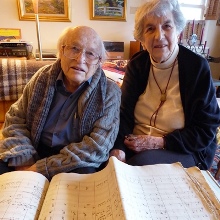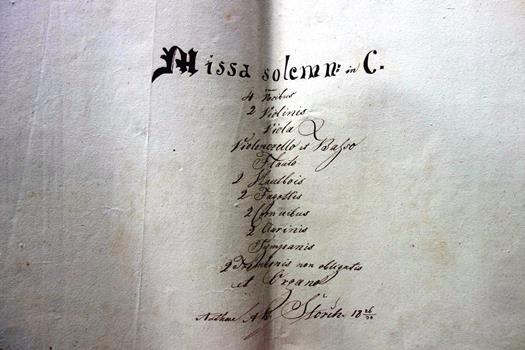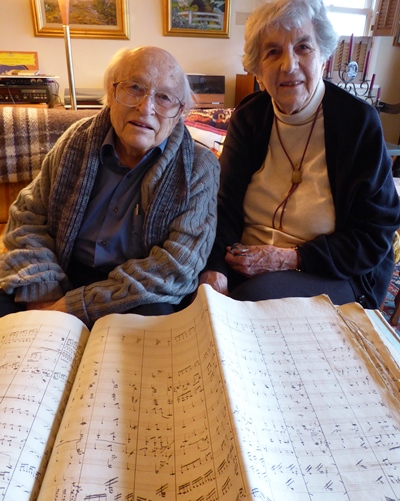— by Lynn Baker for the Orcas Choral Society —
After almost 200 years and more than 5,000 miles, a choral mass with orchestra composed in 1826 near Prague will come to life, perhaps for the first time, as Orcas Choral Society presents Missa Solemn in C by Alois Bohuslav Storch, April 23 and 24 at the Orcas Center, and May 1 at St. Mark’s Cathedral in Seattle.
The original hand-penned score has long been in the care of Laila Storch, great-great granddaughter of the composer. This performance of her heritage is “something happening in our later life that’s quite an exciting experience,” she said.
Storch and her husband, violinist Martin Friedmann, have been coming to Orcas Island since 1970. Storch, Professor Emeritus of Oboe at the University of Washington, was a 30-year member of the Soni Ventorum Wind Quintet. Their daughter, violinist and violist Aloysia Friedmann, is the Founder and Artistic Director of the Orcas Island Chamber Music Festival. Several festival musicians helped bring this old “new” work to Orcas Choral Society.
From great-aunt Thekla’s attic
“In the 1940s, when my great-aunt Thekla realized I was serious about music, she gave me this package of thick parchment scores wrapped in newspaper from her attic in Oakland, California,” Storch said. “Fortunately, it had not been thrown out.”
The package held three masses and a number of waltzes and small pieces, all by Alois Storch. He lived near Prague and was a pharmacist, but music was obviously his first love,” Laila Storch said. “There are notes and marks all over the scores. The piano pieces are dedicated to a young lady whom he later married, Nina Stain,” she said.
The music got to Thekla’s attic thanks to Alois Storch’s adventuresome son, Jaroslav. He came to America in 1865 and either brought the music with him or had it shipped over later. Jaroslav settled in San Francisco. One of his sons, Zdeny, married Thekla. Another son, Hugo, was Laila’s grandfather.
Laila Storch put the music in a wooden box, and there it stayed. For decades.
“Our son-in-law, pianist Jon Kimura Parker, read through the piano music, but we never saw any possibility of hearing the mass,” Storch said. “It has a big orchestra part and a big chorus, and we didn’t have anyone we would dare approach to go through that score and see what it was like.”
When Friedmann retired from the Seattle Symphony in 2005, he listed restoration of an Alois Storch mass as a to-do project. Eleven years later, he will be able to scratch that one off.
Enter high-tech
“Today, there’s software where you can type in music and then read and hear it,” Friedmann said. “That gave me ideas.”
Friedmann conferred with Adam Stern, conductor of the Seattle Philharmonic. Friedmann and Stern have been regular performers at the Orcas Island Chamber Music Festival. “Adam kindly offered to transcribe the Missa Solemn in C for us. He sent me the music segment by segment, like a TV series,” Friedmann said. “I felt the music is worth performing.”
“This has all been happening during the last year,” Storch said. “It’s very exciting, seeing something coming to life that’s been around for so long.”
Next, find a chorus.
“We’ve known Roger Sherman for years from his Sunday KING-FM radio program, ‘The Organ Loft,’” Storch said. Sherman conducts the Orcas Choral Society. “We were very impressed by their concert of the Bach B Minor Mass last spring. So, after we had an electronic version of the Missa Solemn in C, we gave it to Roger and asked him if he would be interested in performing it. “
“Little could we have ever imagined that we’d first hear this music sung on Orcas Island,” Storch said. “It’s wonderful that there’s such a fine chorus on the island.”
Whether the piece has ever been performed before is something of a mystery. The only evidence that it has been are a few words penciled in German on the back edge of the score. Friedmann is still researching the subject.
“It’s exciting to hear a piece for the first time and to prepare it for performance for possibly the first time ever,” Sherman said. “This follows a tradition in the choral society. Our previous director, Catherine Pederson, commissioned pieces for the chorus. And last year we were among the first choirs in the world to perform the 1733 edition of Bach’s B Minor Mass.”
Add some Schubert
The concert also will feature the well-known Schubert Mass in G.
“Schubert composed his Mass in G in 1815, just 11 years before Storch wrote his Missa Solemn in C,” Sherman said. “It’s a good dramatic pairing – the comfort and fun of a piece many people know well with the excitement of a “new” work.”
Concerts at the Orcas Center are at 7:30 p.m., Saturday, April 23 and 2 p.m., Sunday, April 24. Tickets are $15 for adults, $5 for students, available at www.orcaschoralsociety.org or through the Orcas Center.
The 2 p.m., May 1 concert in St. Mark’s Cathedral in Seattle will be free, with donations gratefully accepted.
And more to come…
What of those other two masses in Laila Storch’s box? Adam Stern is transcribing them, too. Word has it that Stern may conduct at least one Storch mass in Seattle in 2017.
**If you are reading theOrcasonian for free, thank your fellow islanders. If you would like to support theOrcasonian CLICK HERE to set your modestly-priced, voluntary subscription. Otherwise, no worries; we’re happy to share with you.**










So proud of being part of this extraordinary presentation.